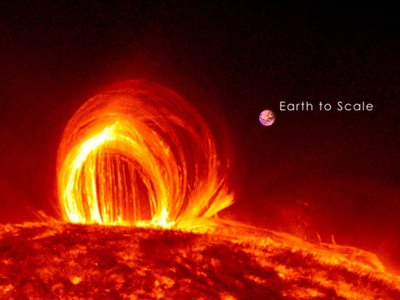The plasma state. Typical properties of space plasmas. The sun and the solar wind, and how they effect the Earth’s space environment. The magnetosphere and the ionosphere, their origin, structure and dynamics. The aurora and geomagnetic storms and substorms. Space weather. Space environment of other celestial bodies. Interstellar and intergalactic plasma and cosmic radiation. Current research topics within space physics.
EF2240 Space Physics 6.0 credits

The course gives a broad survey of space physics and plasma phenomena from the Earth's vicinity to the Universe as a whole.
Information per course offering
Choose semester and course offering to see current information and more about the course, such as course syllabus, study period, and application information.
Course syllabus as PDF
Please note: all information from the Course syllabus is available on this page in an accessible format.
Course syllabus EF2240 (Autumn 2022–)Content and learning outcomes
Course contents
Intended learning outcomes
The goals of the course are that the student should be able to:
- define what is meant by a plasma, and how different types of plasmas can be classified.
- describe the plasma environment in space, with focus on the near-earth environment.
- explain how certain important plasma populations in the solar system, e.g. the Earth's ionosphere and magnetosphere, get their basic properties, and how these properties may differ between the planets.
- make order of magnitude estimates of some properties in space plasmas and space phenomena, e.g. the power dissipated in the aurora, or the amount of current floating from Earth's magnetosphere to its ionosphere.
- model certain space physics phenomena by applying basic physical laws, using simple mathemathics (e.g. model the form of the magnetosphere or estimate the temperature of a sunspot).
- describe current research within space physics and explain it to an interested layman.
Literature and preparations
Specific prerequisites
Documented knowledge in general physics, 5 ECTS-credits.
The upper secondary course English B/6.
Recommended prerequisites
For single course students: 60 hp and documented proficiency in english B or equivalent.
Literature
Examination and completion
Grading scale
Examination
- TEN1 - Examination, 6.0 credits, grading scale: A, B, C, D, E, FX, F
Based on recommendation from KTH’s coordinator for disabilities, the examiner will decide how to adapt an examination for students with documented disability.
The examiner may apply another examination format when re-examining individual students.
If the course is discontinued, students may request to be examined during the following two academic years.
Other requirements for final grade
Written examination. During the course, also continual examination will take place; some activities will provide bonus points which will be added to the written examination.
Examiner
Ethical approach
- All members of a group are responsible for the group's work.
- In any assessment, every student shall honestly disclose any help received and sources used.
- In an oral assessment, every student shall be able to present and answer questions about the entire assignment and solution.
Further information
Course room in Canvas
Offered by
Main field of study
Education cycle
Supplementary information
In this course, the EECS code of honor applies, see:
http://www.kth.se/en/eecs/utbildning/hederskodex.